This poem is a Petrarchan sonnet It has 14 lines written in iambic pentameter Petrarchan sonnets are broken into two sections of patterned rhymes the first section of 8 lines (ABBA ABBA) and the final 6 lines (CD CD CD) Analysis How do I love thee? · A good example comes from these lines "I love thee to the level of every day's / Most quiet need, by sun and candlelight" There is a great example of a simile in this line "I love thee freely, as men strive for right" here, she compares the amount that she loves her partner to the strength with which men "strive" for what is right, or just1705 · Line By Line Analysis of How Do I Love Thee?

Barrett Browning How Do I Love Thee Fun Worksheet Activity For Poem
Shall i compare thee analysis line by line
Shall i compare thee analysis line by line-This could be a conventional opening line The use of "thee" instead of "you" adds a layer of tradition The line gives no hint that the rest of the sonnet will explore love in unconventional ways The speaker refrains from identifying her belovedBut 'tis my heart that loves what they despise, Who, in despite of view, is pleased to dote Nor are mine ears with thy tongue's tune delighted;



How Do I Love Thee Rhyme Scheme
How do I love thee is a phrase that could very easily come from Shakespeare – perhaps from one of his sonnetsThe line is from a sonnet and it is about love In fact, if you were asked in a quiz where it came from, you may well answer "Shakespeare"" from the Sonnets from the Portuguese XLIII is a Petrarchan sonnet of fourteen lines, consisting of an octave and a sestet It was written by Elizabeth Barrett Browning () in 1845 and was composed for her husband, the renowned Romantic poet, Robert Browning · How Do I Love Thee Style Analysis "How Do I Love Thee" by Elizabeth Barret Browning, is a sonnet that is made up of fourteen stanzas In the poem, the poet describes how she loves The speaker uses a lot of hyperbole and exaggeration to define her love which locks the reader into the poem, also has a tone that makes us feel that she is in love
· Poetry Guides LitCharts Poetry Guides will help you actually understand poetry, with linebyline analysis, a modern translation, and explanations of speaker, setting, meter, rhyme scheme, poetic devices, and more Can't find what you need?I love thee purely, as they turn from praiseMy love for you is comparative to the love God has for Humans Line 5 There is not a day that goes by that I do not love
Read these lines from the poem "I love thee with the breath, Smiles, tears, of all my life;Let me count the waysLet me count the ways I love thee to the depth and breadth and height My soul can reach, when feeling out of sight For the ends of being and ideal grace I love thee to the level of every day's Most quiet need, by sun and candlelight I love thee freely, as men strive for right;




Analysis Of Poem How Do I Love Thee Youtube




How Do I Love Thee Analysis Essay Example
1908 · How do I love thee?Nor tender feeling, to base touches prone, · An Analysis on the poem "How Do I Love Thee" By Elizabeth Barrett The poem "How do I Love Thee" by Elizabeth is from the Sonnet from Portuguese, a sequence that this poet had written during her courtship The poem is a true account of the unconditional and immense love she felt for her husband Robert Browning
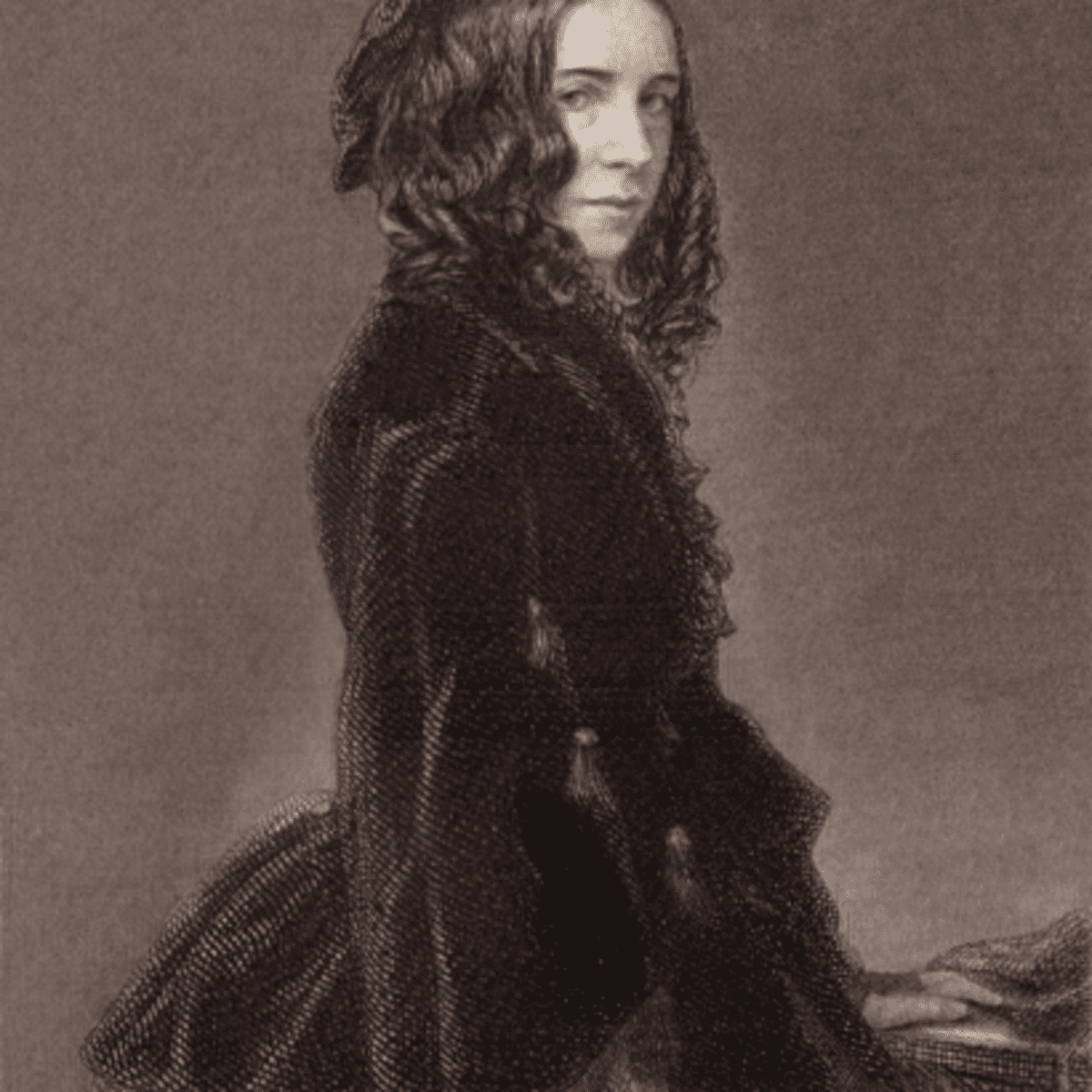



Analysis Of Poem How Do I Love Thee By Elizabeth Barrett Browning Owlcation
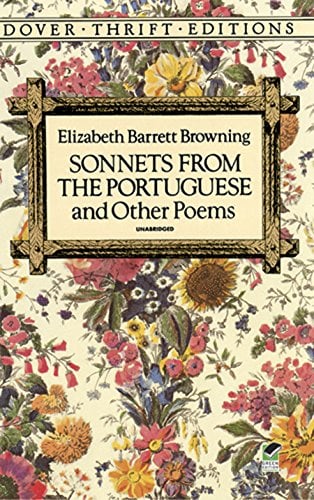



Sonnets From The Portuguese By Elizabeth Barrett Browning Full Text
English Comp II 28 March 11 Poem Analysis In How do I love thee by Elizabeth Barrett Browning I believe that the person talking is professing about a kind of love that can stand the test of time You know that kind of love Every day and moment is cherished by bothHow do I love thee?Let me count the ways I love thee to the depth and breadth and height My soul can reach, when feeling out of sight For the ends of being and ideal grace I love thee to the level of every day's Most quiet need, by sun and candlelight I love thee freely, as men strive for right I love thee purely, as they turn from praise




How Do I Love Thee Sonnets Poetry
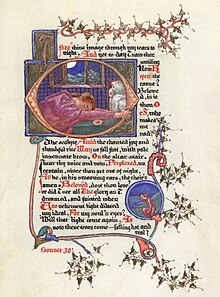



Sonnets From The Portuguese Wikipedia
· Barrette's "How Do I Love Thee" follows the structure of a Patriarchal sonnet, and Is therefore written In Iambic pentameter It consists of 14 lines, and Is divided Into an octave and a sestets The octave has a rhyme scheme of ABA ABA It presents the primary problem facing the author, in this case being the question of her declarationElizabeth Barrett Browning wrote this incredible classic poem "How Do I Love Thee?" (Sonnet 43) She wrote this romantic love poem along with many other sonnPoem Analysis In How do I love thee by Elizabeth Barrett Browning I believe that the person talking is professing about a kind of love that can stand the test of time You know that kind of love Every day and moment is cherished by both Each person knows almost everything about each other and they have been together for what would seem like




How Do I Love Thee By Elizabeth Barrett Browning Sonnet 43 ব ল ল কচ র Literature Kobita Youtube




Elizabeth Barrett Browning Sonnet 43 Annotation Youtube
Lines 79 These lines use anaphora, beginning with the same phrase, "I love thee," as do lines two, five, and eleven This parallel structure emphasizes that the poem is in many ways a catalog or list of ways of loving, rather than an extended argument or scene like some other poems Lines 1214 We can't help but think that claiming you're going to love someone "better after death," whether8 I love thee purely, as they turn from praise · The words that show the anaphora in this poem are "I love thee", the repetition of the words "I love thee" comes at the beginning of a few lines There are 6 repetition of that words in 6 lines that can be seen at line 2, 5, 7, 8, 9, and 11




If Thou Must Love Me Let It Be For Nought Sonnets From The Portuguese 14 Poem Summary And Analysis Litcharts
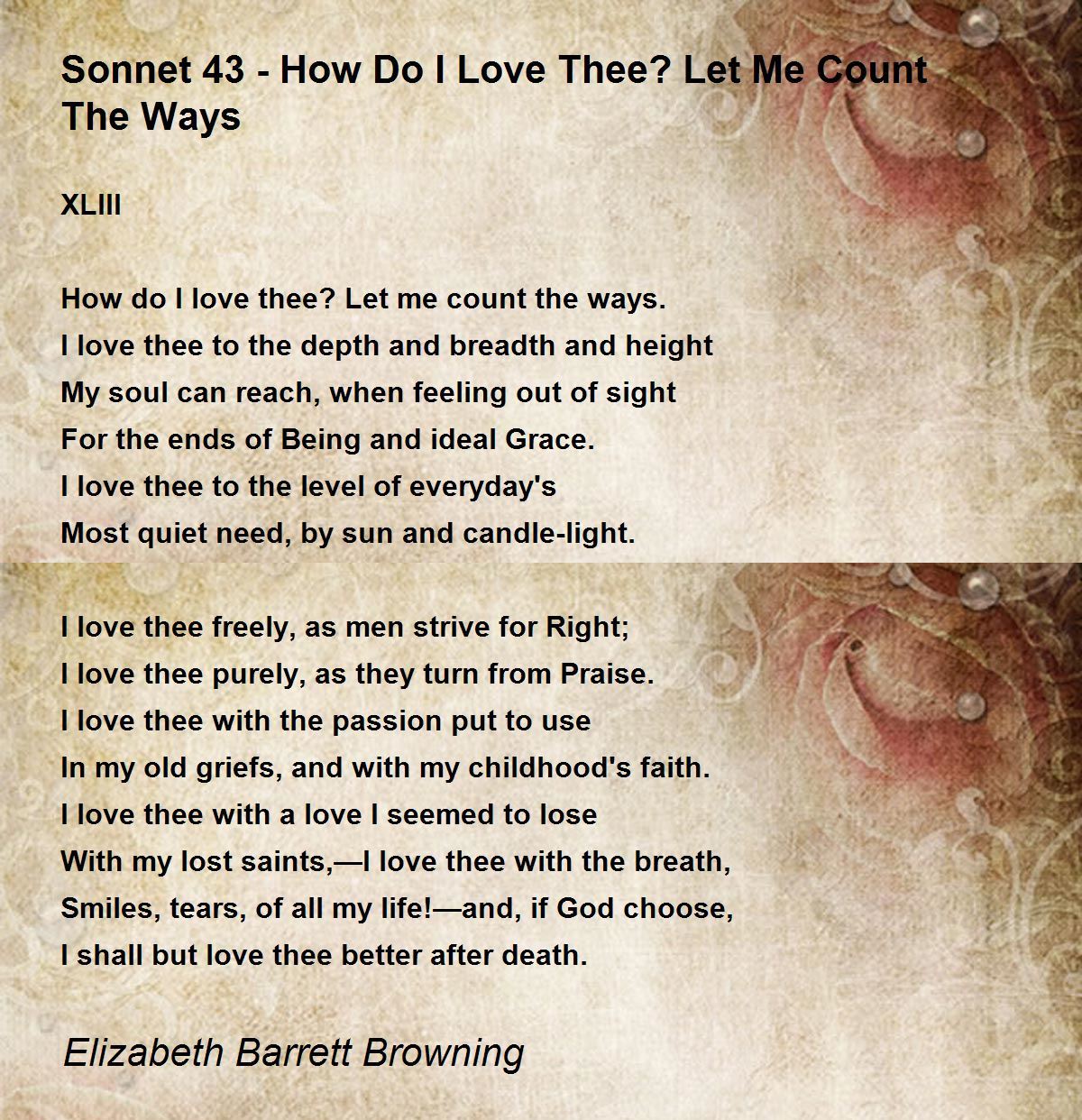



Sonnet 43 How Do I Love Thee Let Me Count The Ways Poem By Elizabeth Barrett Browning Poem Hunter
ReadWorksorg How Do I Love Thee? · Analysis of Sonnet 141 In faith, I do not love thee with mine eyes In faith I do not love thee with mine eyes, For they in thee a thousand errors note;Let me count the ways I love thee to the depth and breadth and height My soul can reach, when feeling out of sight For the ends of Being and ideal Grace I love thee to the level of every day's Most quiet need, by sun and candlelight I love thee freely, as men strive for Right;
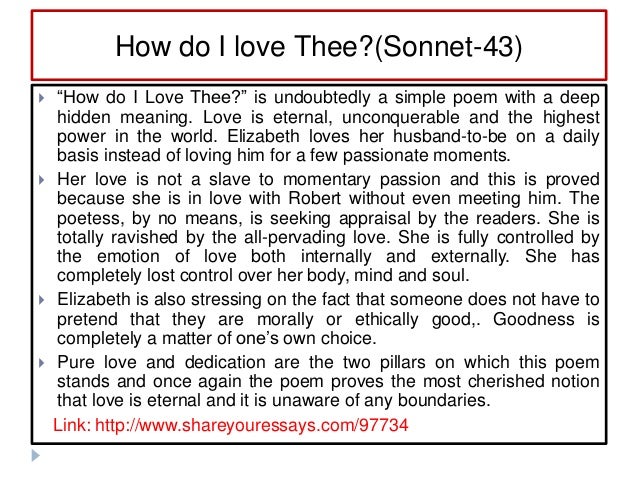



Sonnet 43 How Do I Love Thee By Elizabeth Barrette Browning
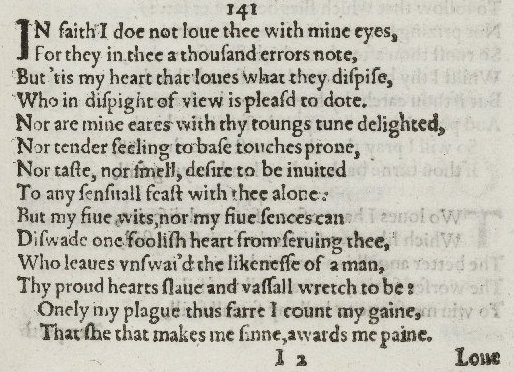



Sonnet 141 Wikipedia
· Sonnet 43, also known as "How Do I Love Thee" is a literary classic written by Elizabeth Barrett Browning in 1850 This poem follows a Petrarch sonnet structure, even though she lived closer to Shakespear's time This poem explores all the ways the author loves someone, it even goes through almost all stages of lifeI love thee purely, as they turn from PraiseDo I Love Thee Poem Analysis 781 Words4 Pages How Do I Love Thee – Elizabeth Barrett Browning interprets the meaning, tone, and overall effect of a poem How Do I Love Thee by Elizabeth Barret Browning is an iconic and powerful love poem The work is part of Sonnets from the Portuguese, a collection of poems that Elizabeth Browning wrote for
(64).jpg)



Sonnet 43 By Elizabeth Barrett Browning Quiz Proprofs Quiz




25 Pocket Poems Ideas Poems Poetry Words
· As we have already briefly mentioned above, "How do I love thee?" is a sonnet, a 14 lined poem with a rhyme scheme of ABBA ABBA CD CD CD in the style favoured by Petrarch In it the composer has utilised iambic pentameter (there are five iambs, or twobeat feet of unstressedstressed syllables per line), which adds to the musical quality of the pieceHow Do I Love Thee Rhyme Scheme Analysis "How Do I Love Thee" , by Elizabeth Barrett Browning , is an English sonnet , written in 1845 It has fourteen lines in total It has ten syllables per line The type of poem supports the theme of the poem Sonnets are considered the poetic language of love · I love thee to the level of everyday's This is a next way to love her beloved The key is "to the level of everyday's" This line becomes more grounded and down to earth Even though her love is passionate "depth and breadth and height", she also loves her beloved in regular "everyday's" or daytoday way




How Do I Love Thee Sonnets Poetry
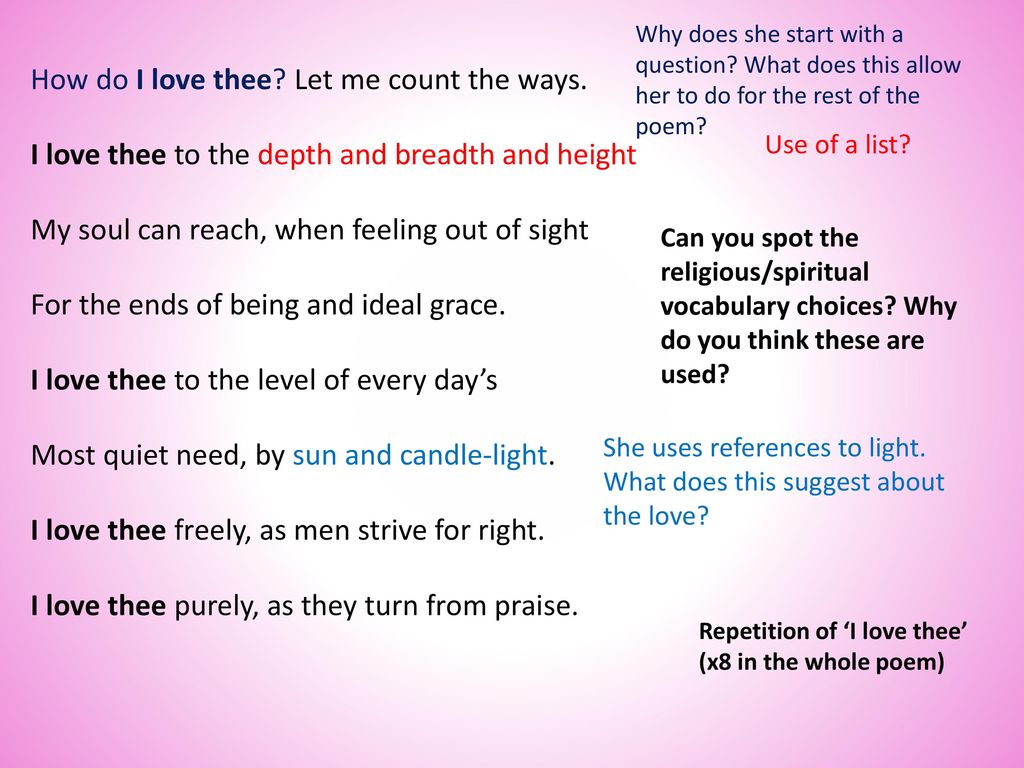



Sonnet 43 Elizabeth Barrett Browning Ppt Download
Let me count the ways I love thee to the depth and breadth and height My soul can reach, when feeling out of sight For the ends of being and ideal grace I love thee to the level of every day's Most quiet need, by sun and candlelight I love thee freely, as men strive for right I love thee purely, as they turn from praiseHow do I love thee?How do I love thee?
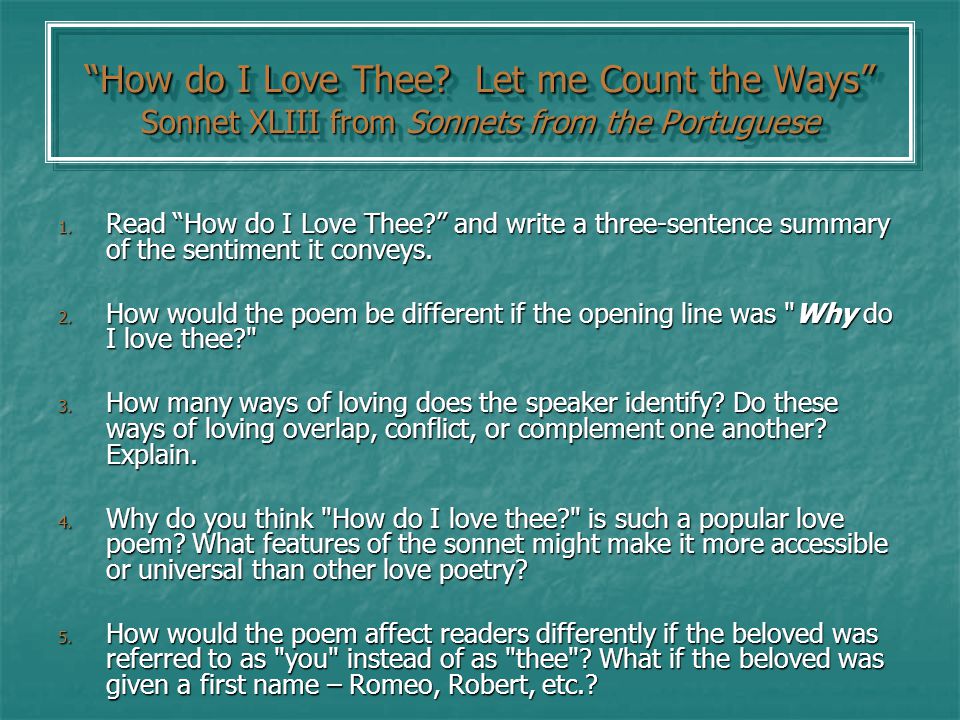



Elizabeth Barrett Browning Ppt Video Online Download




04 05 Chart Sonnet How Do I Love Thee Analysis Chart Literary Elements Example From Poem Simile I Love Thee Purely As Men Strive For Right Repetition Course Hero
1915 · The poem "How Do I Love Thee? · We will write a custom essay on Poetry analysis on "How Do I Love Thee" and "Sonnet XVIII" specifically for you for only $1638 $139/page Order now It resolves the problem presented by clarifying the ways In which the author loves her beloved, and calming that her love would be strengthened in the afterlife · 1 How do I love thee?
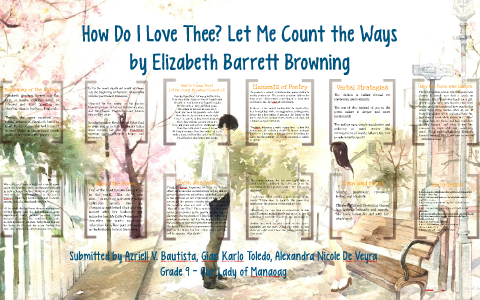



How Do I Love Thee By Elizabeth Barrett Browning By Len Toi
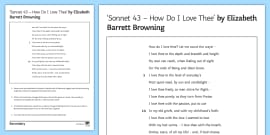



Gcse Elizabeth Barrett Browning And How Do I Love Thee Poet Study Pack
· The final lines truly show how strong her love is "I shall but love thee better after death" this sentence explains how true love can never be broken in any situation or predicament 'How do I love thee' is a very powerful love poem written for Elizabeth's true love · The opening line states "How do I love thee?", and then repeats the phrase "I love thee" throughout the poem to answer the question Lines 2,5,7,8,9, and 11 all open with the same phrase to state that these are all the ways she loves They all hold a separate piece to the puzzle of how she loves and/or conveys her love1909 · And then the poet spends the next three and a half lines juxtaposing her current love against the passions and depth of feeling she experienced in the past "I love thee




How Do I Love Thee Let Me Count The Ways Sonnets From The Portuguese 43 Poem Summary And Analysis Litcharts




How Do I Love Thee Let Me Count The Ways Sonnets From The Portuguese 43 Poem Summary And Analysis Litcharts
And, if God choose, I shall but love thee better after death" What is the meaning of the word "but" in the last line?0428 · I love thee to the depth and breadth and height My soul can reach, when feeling out of sight For the ends of being and ideal grace I love thee to the level of every day's Most quiet need, by sun and candlelight I love thee freely, as men strive for right I love thee purely, as they turn from praise I love thee with the passion put to useLet me count the ways I love thee to the depth and breadth and height My soul can reach, when feeling out of sight For the ends of being and ideal grace I love thee to the level of every day's Most quiet need, by sun and candlelight I love thee freely, as men strive for right I love thee purely, as they turn from praise
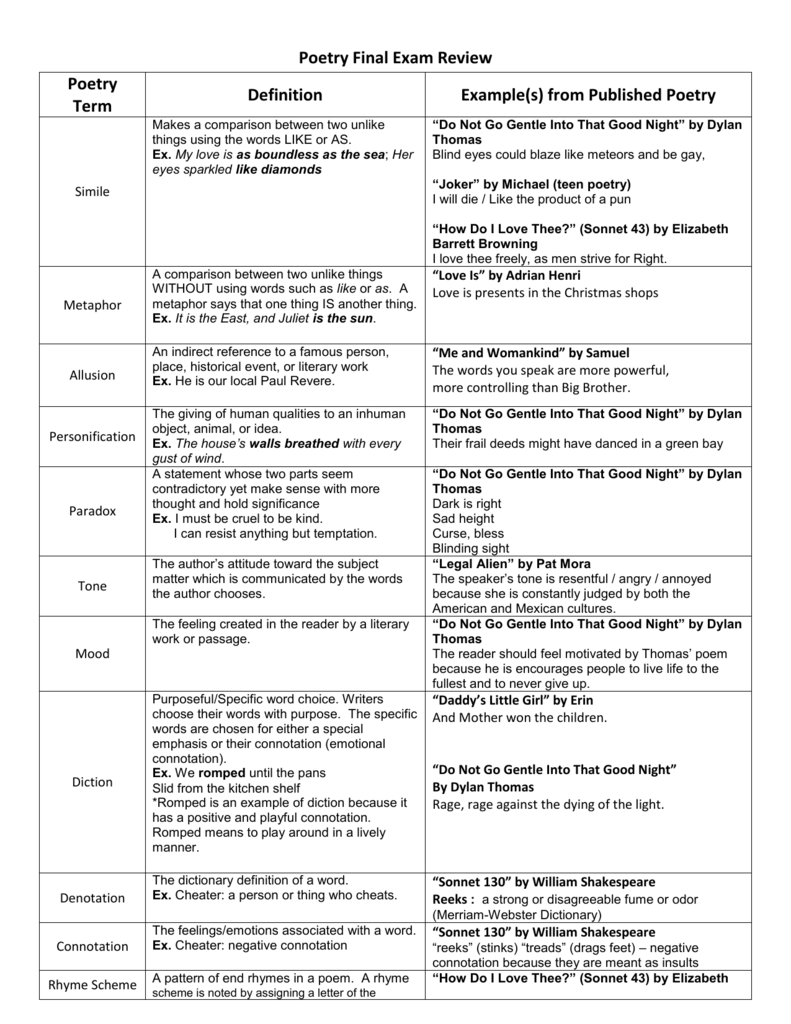



From Published Poetry
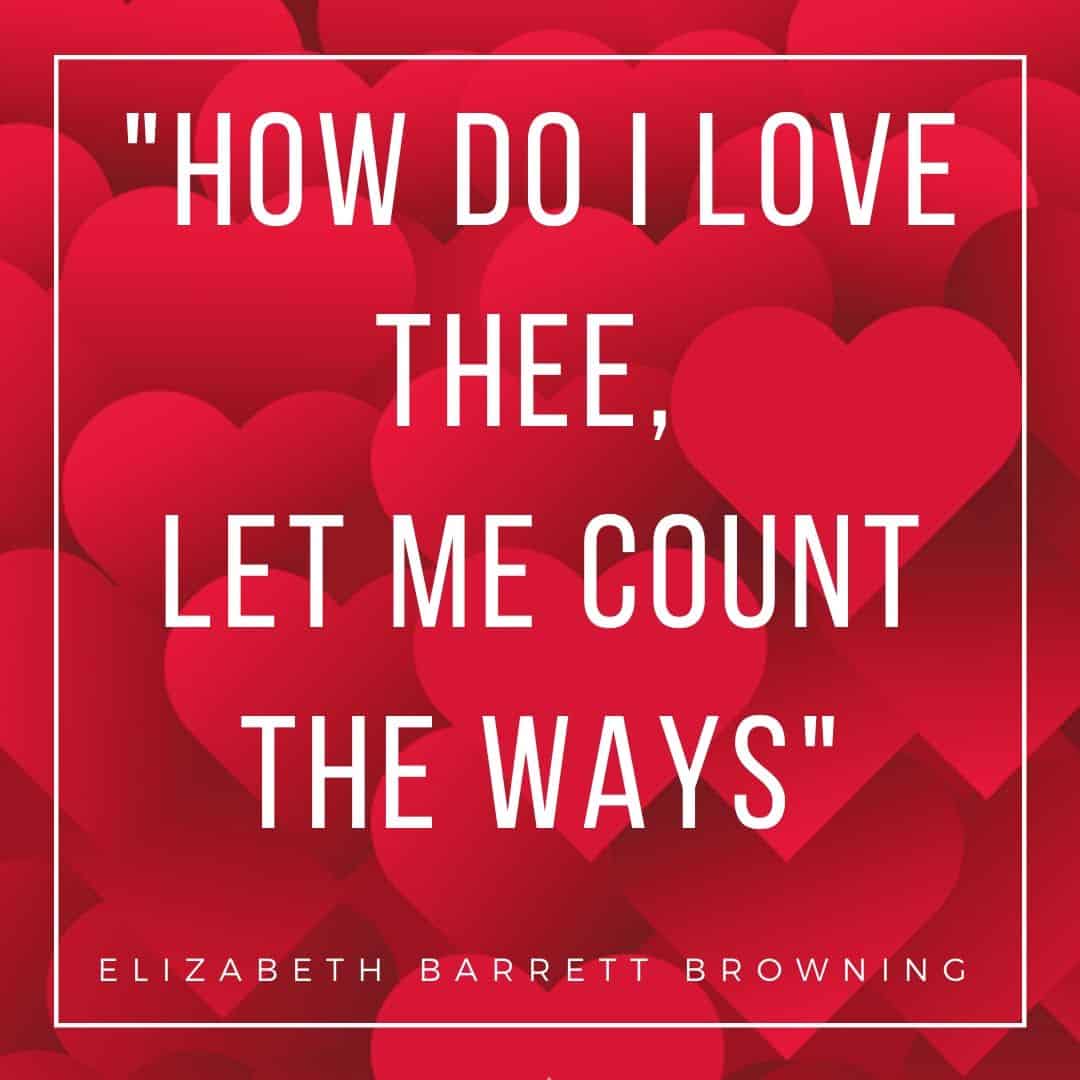



How Do I Love Thee Let Me Count The Ways Sonnet Analysis
· Lines 112 are about love, and then it shifts to a more serious tone, where the poet speaks about love In the lines 23, 56, 914, the poet uses enjambment, which helps the poem 'run on', so you flow into the next line and continue momentum instead of the usual rhythm a poem would have The first line "How do I love thee?Request a new guide Beat!Poetry Analysis Elizabeth Barrett Browning's "How Do I Love Thee " February 5, 15 / rukhaya / 0 Comments Elizabeth Barrett Browning penned a series of 44 sonnets pronouncing her profound love for her fiancé Robert Browning




An Analysis Of How Do I Love Thee By Elizabeth Barret Browning One Of The World S Most Famous Love Poems Brighthub Education




Sonnet 43 How Do I Love Thee Elizabeth Barrett Browning Teaching Resources
Let me count the ways 2 I love thee to the depth and breadth and height 3 My soul can reach, when feeling out of sight 4 For the ends of being and ideal grace 5 I love thee to the level of every day's 6 Most quiet need, by sun and candlelight 7 I love thee freely, as men strive for right;I love thee with the passion put to use In my old griefs, and with my childhood's faith I love thee with a love I seemed to lose With my lost saints―I love thee with the breath, Smiles, tears, of all my life!―and, if God choose, I shall but love thee better after death" Linebyline Analysis How do I love thee? · Analysis of How Do I Love Thee by Elizabeth Barrett Browning The poet while trying to express her undying love for her beloved begins to count the some ways in which she loves him By counting the number of ways, the poet is trying to show that the love in her heart for her soul mate is present in all her walks of life
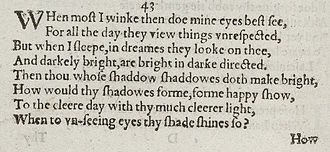



Sonnet 43 Wikipedia
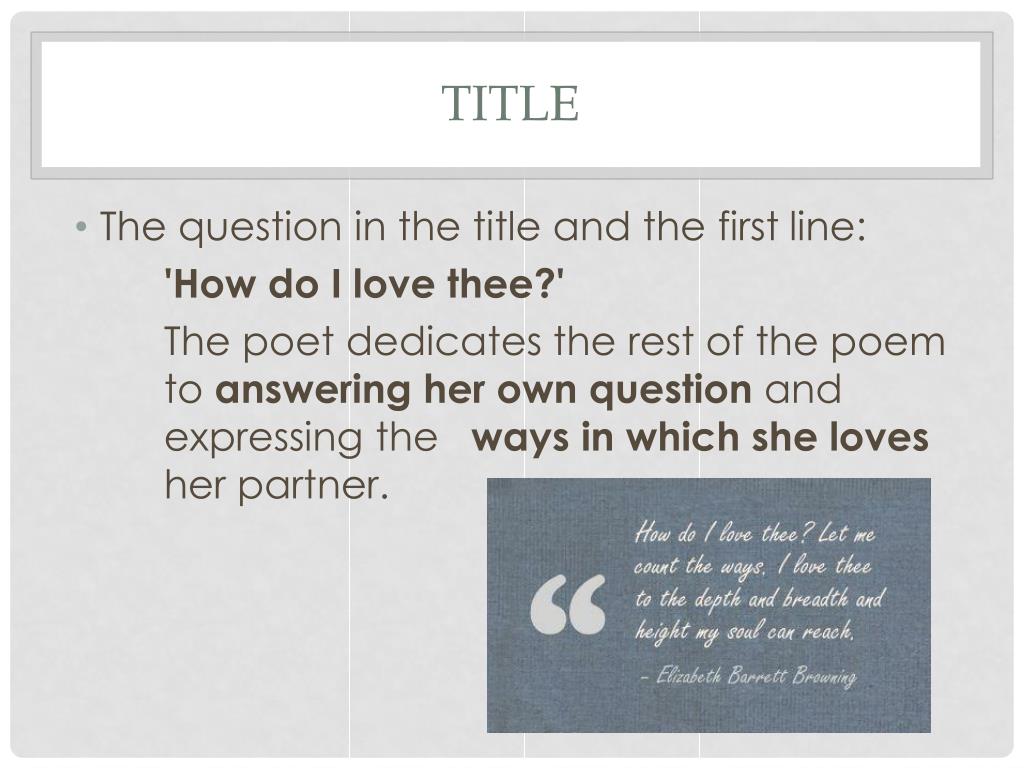



How Do I Love Thee Tone And Mood
Sonnet 43 Lines 14 This sonnet helped kickstart many more on the theme of modern (Victorian) love, from a woman's perspective Note the emphasis is on the repetition and reinforcement of the speaker's love for someone; · I love thee to the level of every day's Most quiet need, by sun and candlelight I love thee freely, as men strive for right I love thee purely, as they turn from praise I love thee with the passion put to use In my old griefs, and with my childhood's faith I love thee with a love I seemed to lose With my lost saints I love thee with the breath,1801 · In dealing with the theme of love, both poems reference the beauty of their emotions, and the everlasting nature of such beauty Barrette's "How Do Love Thee" follows the structure of a Patriarchal sonnet, and is therefore written in iambic pentameter It consists of 14 lines, and is divided into an octave and a sestets



How Do I Love Thee Rhyme Scheme
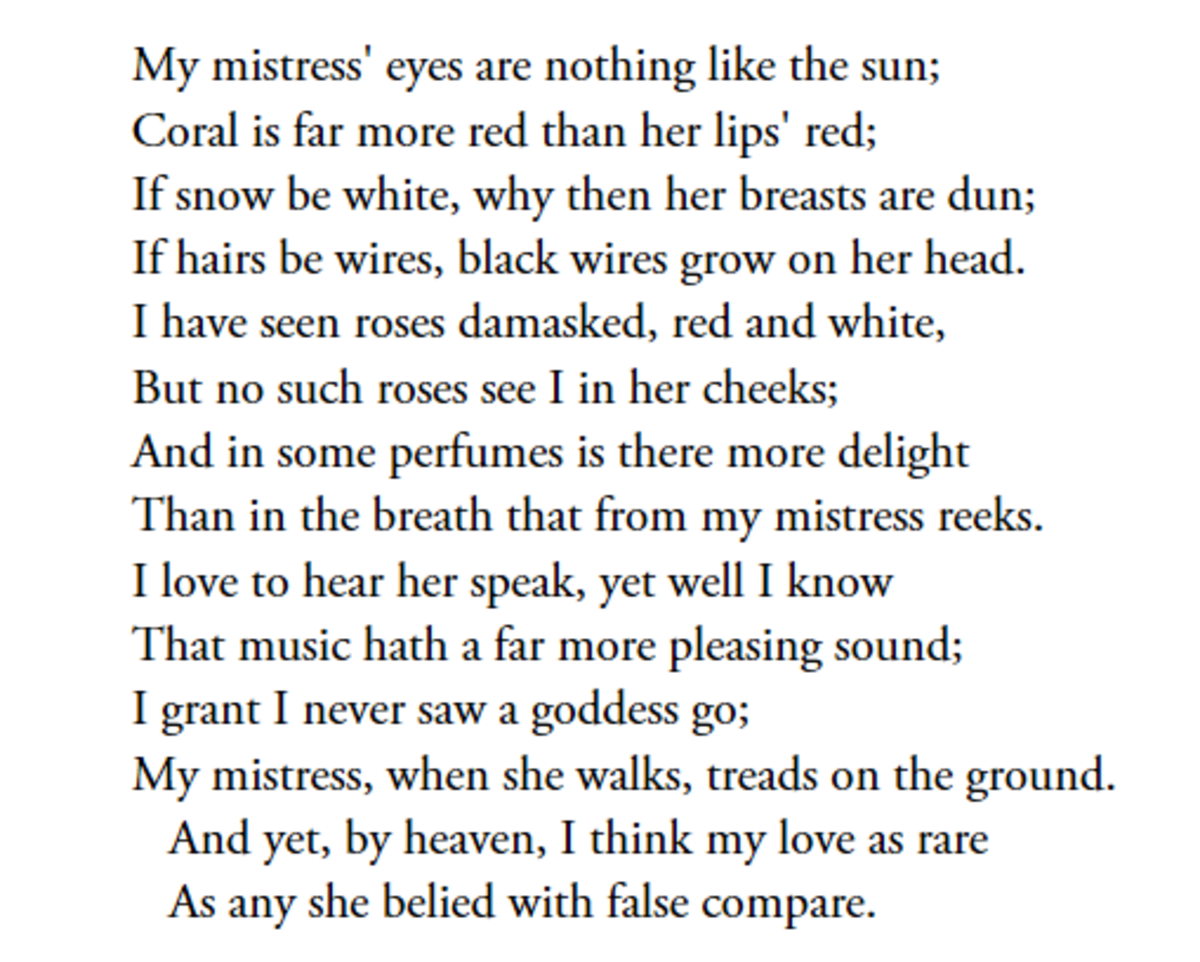



Analysis Of Sonnet 130 By William Shakespeare Owlcation
Let me count the waysAverage number of words per line 9 Mood of the speaker The punctuation marks are various Neither mark predominates The author used lexical repetitions to emphasize a significant image; · Assonance Assonance is the repetition of vowel sounds in the same line, such as the sound of /ee/ and /i/ in "I love thee freely, as men strive for right;" and the sound of /e/ in "I love thee to the depth and breadth and height"




Barrett Browning How Do I Love Thee Fun Worksheet Activity For Poem




How To Analyze A Shakespearean Sonnet
· How do I love thee?0429 · The speaker begins the last four lines of the sonnet by repeating the key phrase, "I love thee," for the last time The tone remains somber, as she now mentions loss She explains ambiguously that she has lost love for the "lost saints" in her life, suggesting a loss of religious faith or confidence in people she once held in high esteemThere is no mention of a specific name or gender, giving the sonnet a universal appeal



Analysis Of How Do I Love Thee By Elizabeth Barret Browning Gcse English Marked By Teachers Com
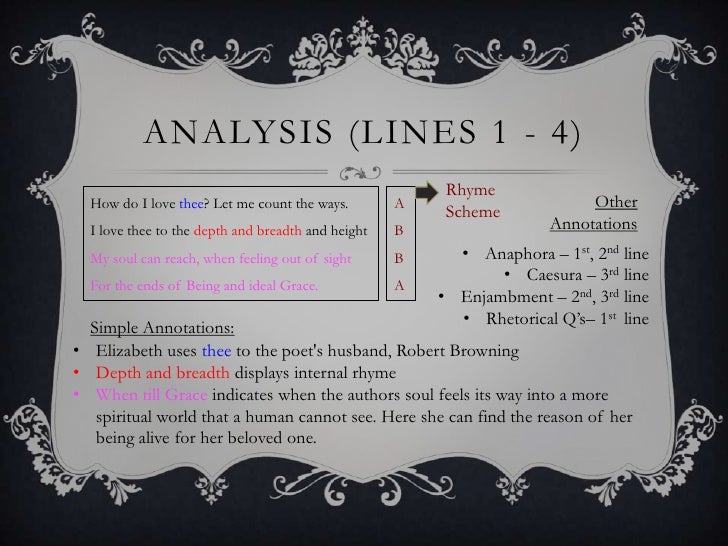



Sonnet 43 1
And, i, thee, love, with, my are repeated The poet used anaphora at the beginnings of some neighboring lines The same word i is repeatedLine 1 I love you I love you in many ways Line 2 I love you to the best of my ability Line 3 I love you with my soul (soul mates) Line 3 4 Even when I lose faith in God and the human race, I will still love you or; · How Do I Love Thee is a fourteenline rhymed lyric poem, and is written in iambic pentameter The rhyme scheme of this poem is that it 's not a show more content She says "writing can be an expression of one 's innermost feelings It can allow the reader to tap into the deepest recesses of one 's heart and soul




Love After Love By Derek Walcott Analysis Essay Example




Sonnet 43 How Do I Love Thee By Elizabeth Barrette Browning




Parallelism In Poetry Definition Examples Video Lesson Transcript Study Com



Sonnet 43 How Do I Love Thee This Sonnet By Elizabeth Browning Is An Attempt To Measure And Quantify Love Gcse English Marked By Teachers Com




Pin On Poetry




Sonnet 43 How Do I Love Thee Let Me Count Poem Analysis




Poem Analysis Of John Clare S First Love Free Essay Example




12 Greatest Love Poems Ever Written




Sonnet 43 How Do I Love Thee Let Me Count The Ways Sonnet 43 How Do I Love Thee Let Me Count The Ways Summary And Analysis Gradesaver




How Do I Love Thee Poem
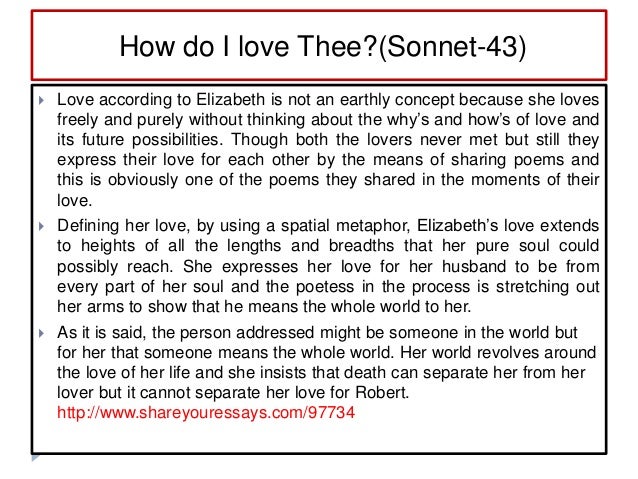



Sonnet 43 How Do I Love Thee By Elizabeth Barrette Browning
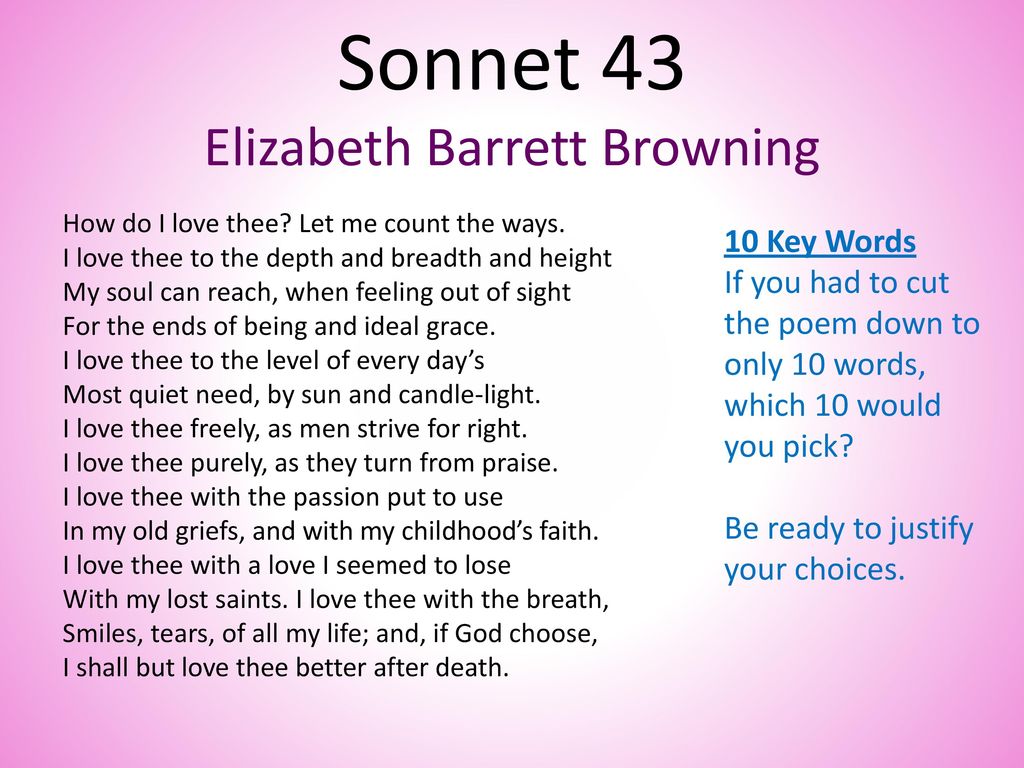



Sonnet 43 Elizabeth Barrett Browning Ppt Download




Ppt Sonnet 43 How Do I Love Thee Powerpoint Presentation Free Download Id




How Do I Love Thee Analysis Essay




A Short Analysis Of Elizabeth Barrett Browning S How Do I Love Thee Let Me Count The Ways Interesting Literature



Comparison Of How Do I Love Thee By Elizabeth Barrett Browning And A Birthday Written By Christina Rosetti Gcse English Marked By Teachers Com
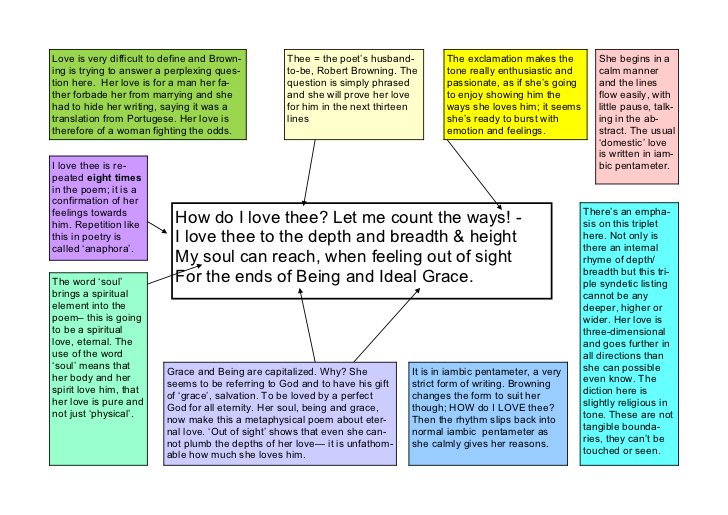



Hoh English The 2nd Poem In Our Eduqas Poetry Anthology Is Sonnet 43 By Elizabeth Barrett Browning She Would Include This Sonnet In Her Collection Titled Sonnets From The Portuguese




Comparing Browning And Keats Studocu
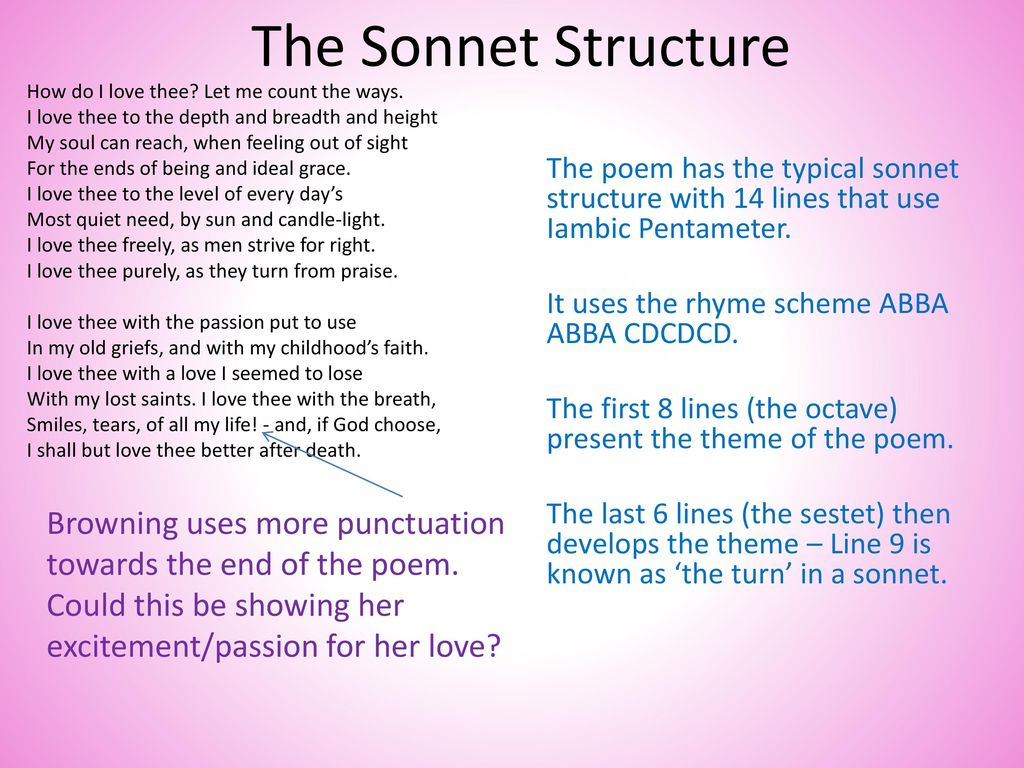



Sonnet 43 Elizabeth Barrett Browning Ppt Download
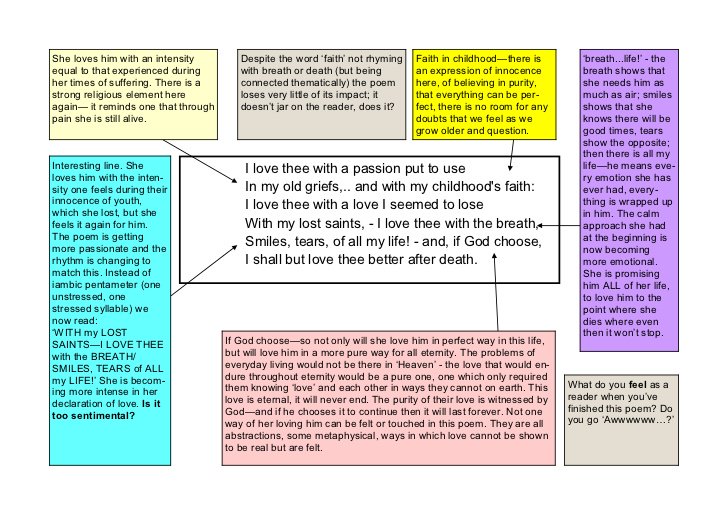



Hoh English The 2nd Poem In Our Eduqas Poetry Anthology Is Sonnet 43 By Elizabeth Barrett Browning She Would Include This Sonnet In Her Collection Titled Sonnets From The Portuguese




Poetry Analysis On How Do I Love Thee And Sonnet Xviii Free Essay Example




Sonnet 43 By Elizabeth Barrett Browning Gcse Analysis Youtube




I Do Not Love Thee By Caroline Elizabeth Poem Analysis




The Analysis Of Poem How Do I Love Thee Let Me Count The Ways A Cup Of Hot Chocolate
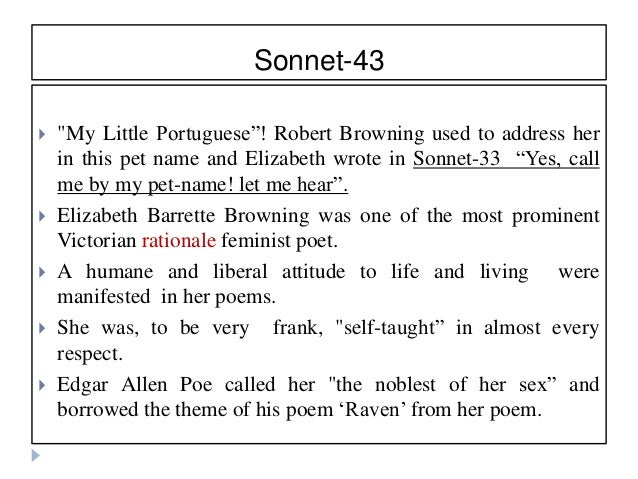



Sonnet 43 How Do I Love Thee By Elizabeth Barrette Browning




I Love Thee Poem By Thomas Hood
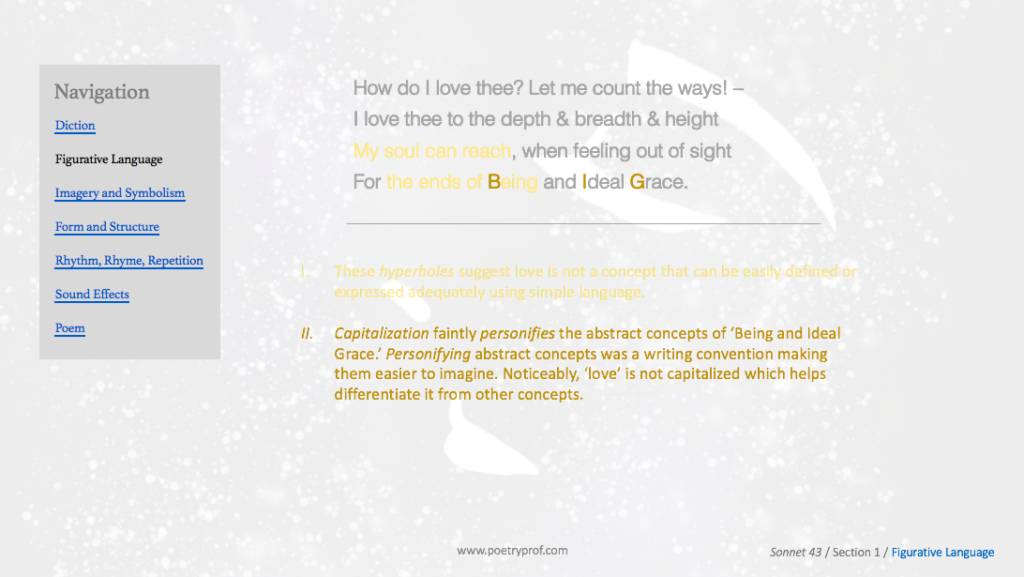



Sonnet 43 Poetry Prof
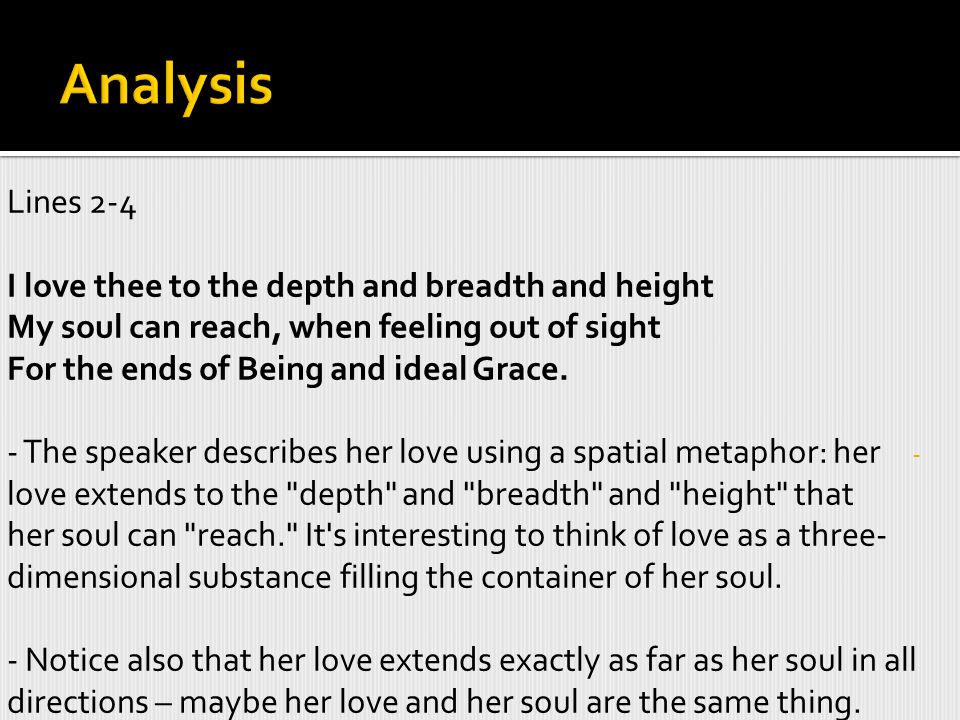



Elizabeth Barret Browning Ppt Download




Manuscript Of Elizabeth Barrett Browning S How Do I Love Thee The British Library



Sonnet 29 I Think Of Thee Meaning And Interpretation
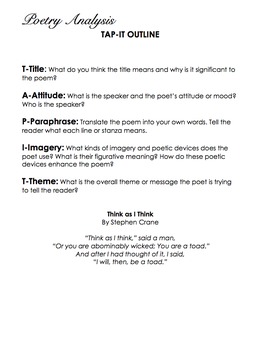



How Do I Love Thee By Elizabeth Barrett Browning Questions Analysis Writing
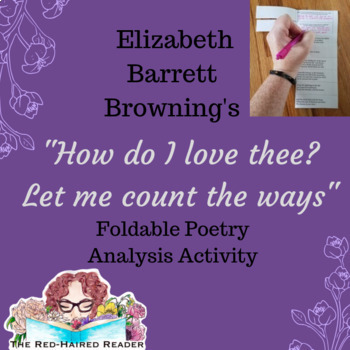



How Do I Love Thee Let Me Count The Ways Elizabeth Barrett Browning Analysis
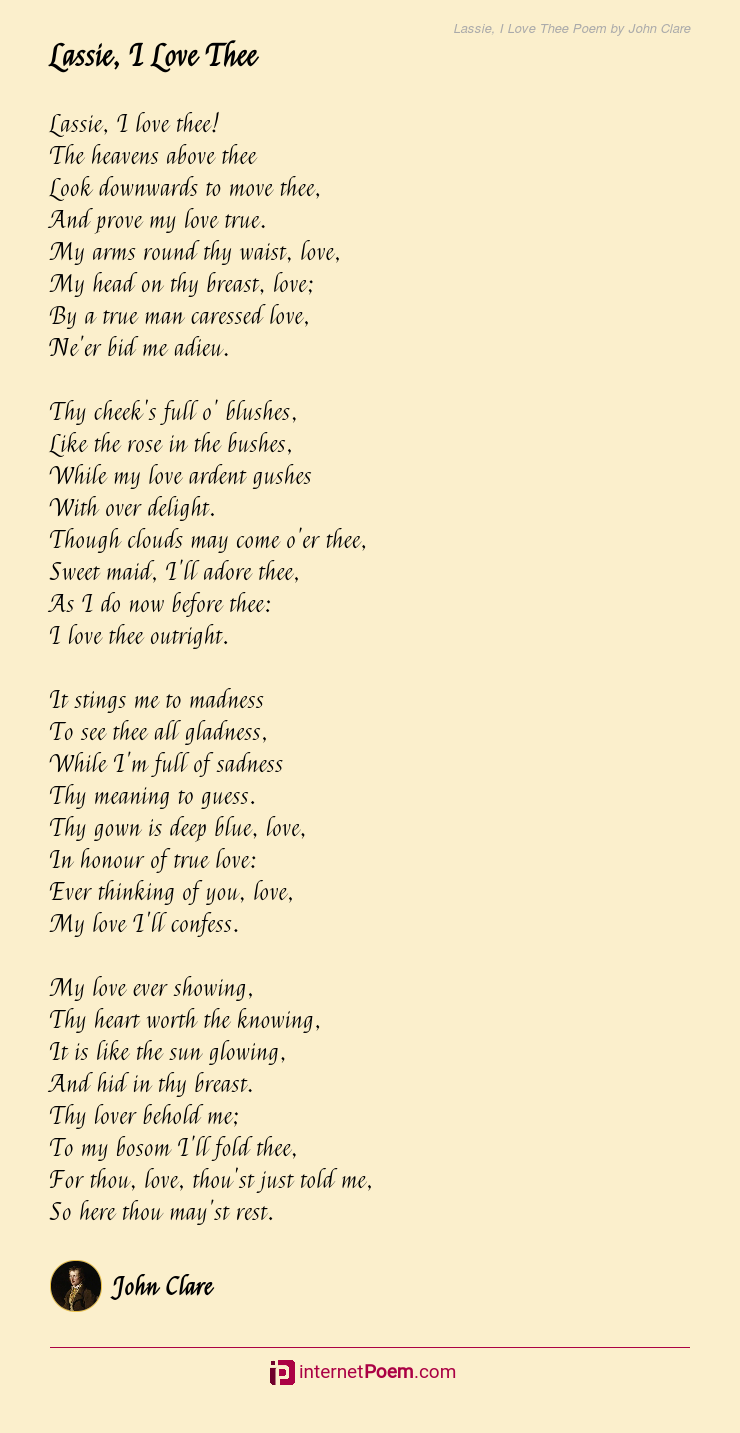



Lassie I Love Thee Poem By John Clare




How Do I Love Thee By Elizabeth Barrett Browning Read By Tom O Bedlam Youtube




How Do I Love Thee Poem



Analysis Of Elizabeth Barrett Browning S How Do I Love Thee A Level English Marked By Teachers Com




How Do I Love Thee Summary Analysis Good Study
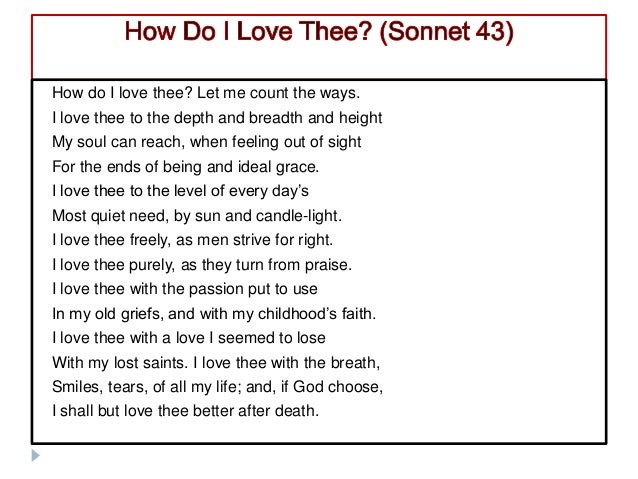



Sonnet 43 How Do I Love Thee By Elizabeth Barrette Browning
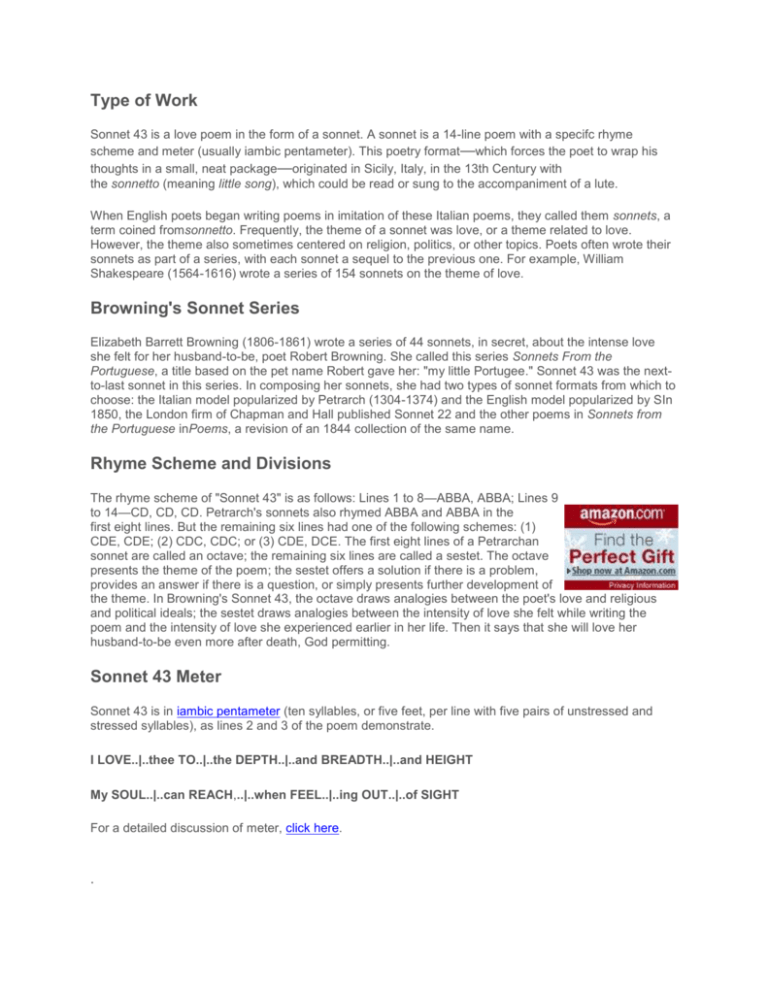



Sonnet 43 Browning Doral Academy Preparatory
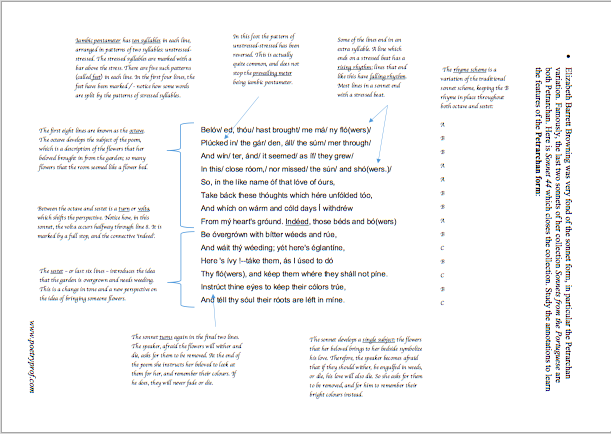



Sonnet 43 Poetry Prof
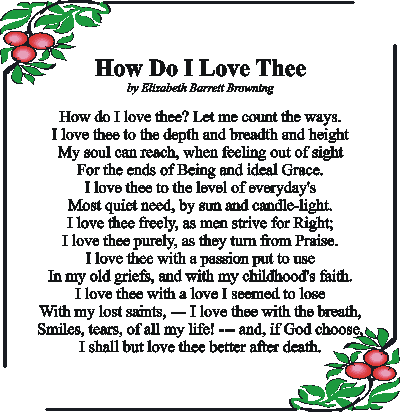



Analysis Of How Do I Love Thee By Elizabeth Barrett Browning Beaming Notes




Hate Poem Example Shakespeare Shall I Compare Thee
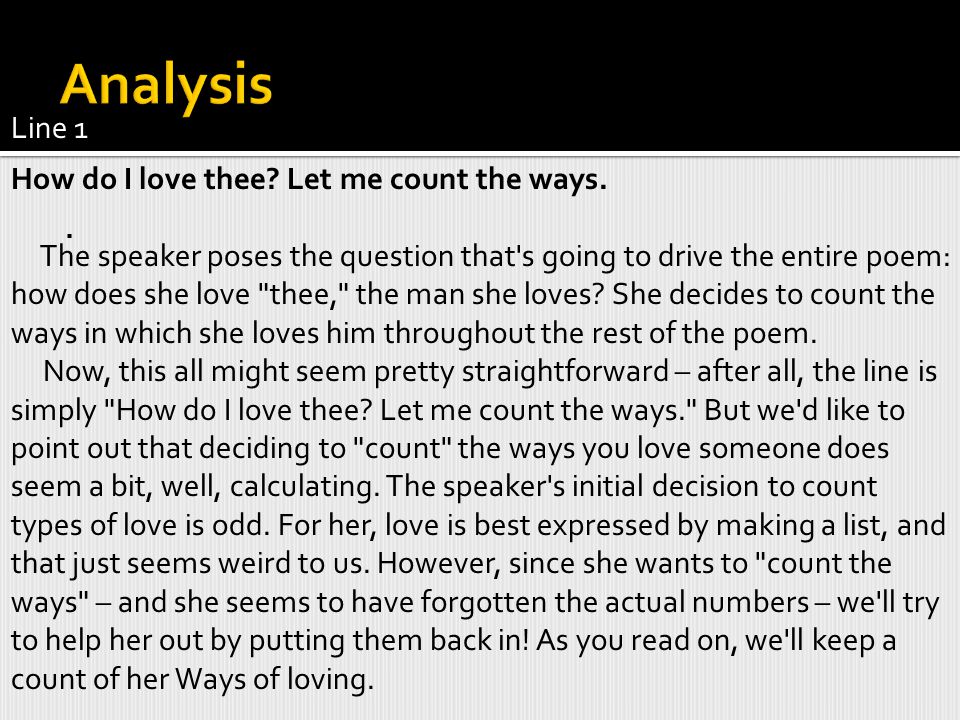



Elizabeth Barret Browning Ppt Download




Departure From Form Of Shakespearean Sonnet I Love Thee To The Depth And Course Hero
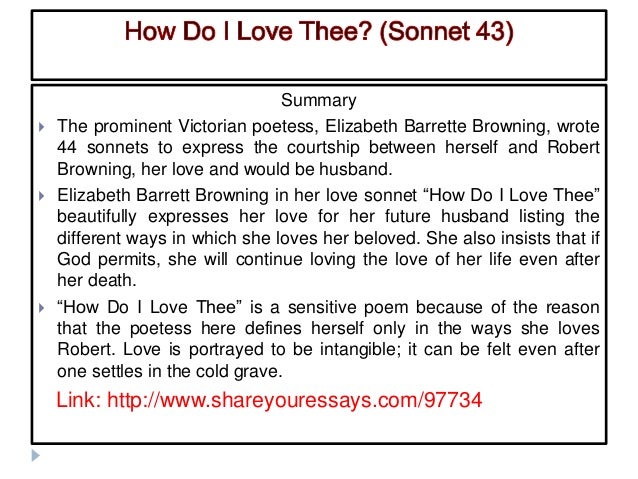



Sonnet 43 How Do I Love Thee By Elizabeth Barrette Browning




How Do I Love Thee




Manuscript Of Elizabeth Barrett Browning S How Do I Love Thee The British Library




How Do I Love Thee Docx Sonnets Robert Browning




Analysis Of Poem How Do I Love Thee By Elizabeth Barrett Browning Owlcation




Love Poetry How Do I Love Thee By Paula Johanson




Pin On Love Quotes Poetry




Elizabeth Barret Browning By Mr Wasim 1 Read The Poem 2 Understand The Meaning 3 Determine The Poem Theme 4 Understand The Poem Analysis Pptx Powerpoint




How Do I Love Thee Sonnet 43 Lessons Teaching Resources




Analysis Of How Do I Love Thee




Browning How Do I Love Thee Close Reading Analysis Biography Reading Analysis Close Reading Middle School



Analysis Of How Do I Love Thee By Elizabeth Barret Browning Gcse English Marked By Teachers Com
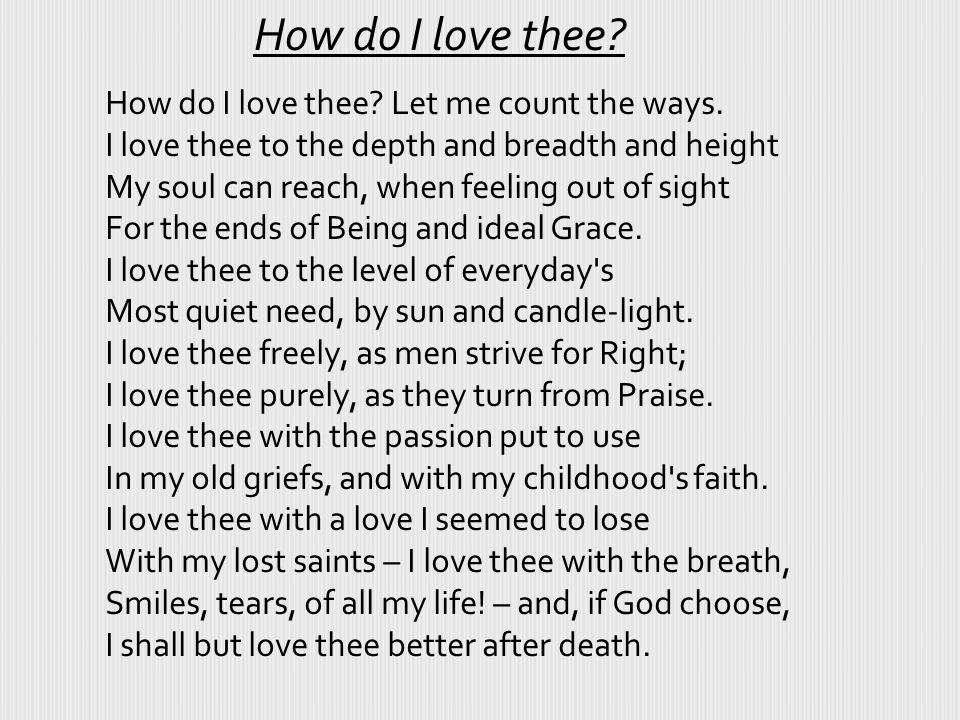



Elizabeth Barret Browning Ppt Download



Sonnet 29 Analysis Elizabeth Barrett Browning Aqa Gcse Writing With Charlotte




How Do I Love Thee Sonnet 43 Elizabeth Barrett Browning Poem Analysis Annotations Gcse English Analysis
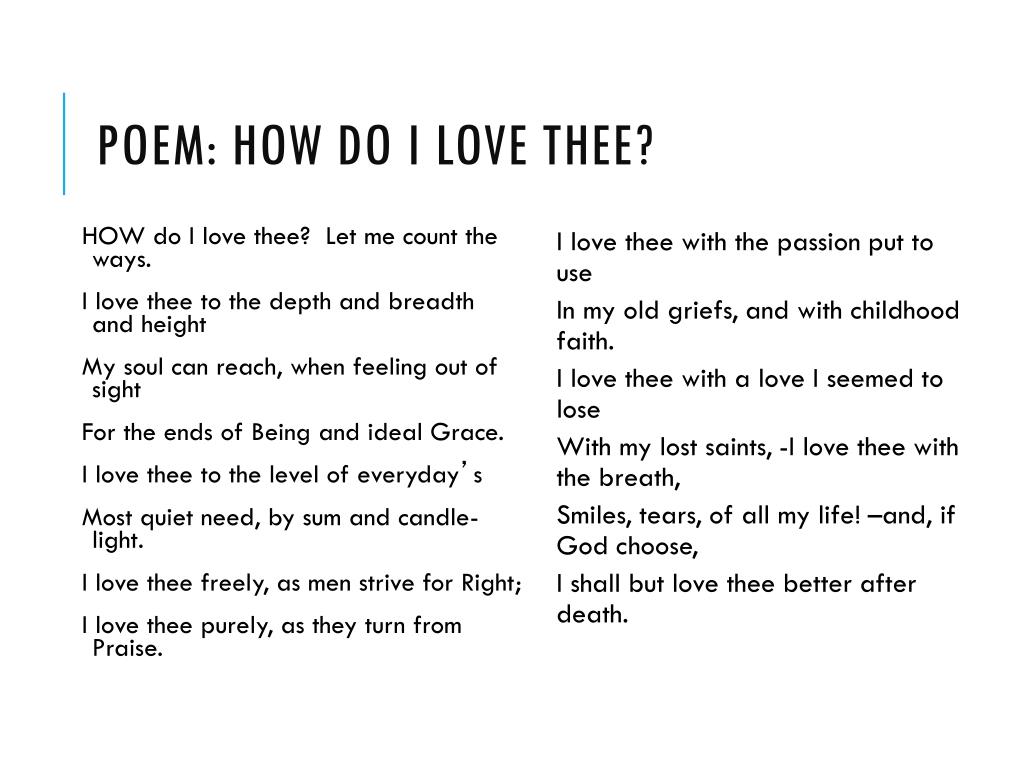



Ppt Elizabeth Barrett Browning Powerpoint Presentation Free Download Id



0 件のコメント:
コメントを投稿